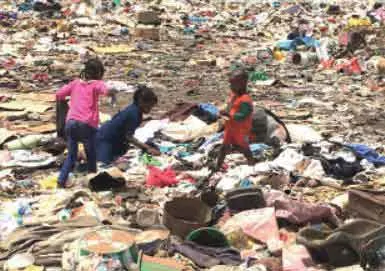

On July 7, 2020, the City of Brownsville Commission approved a recommendation by the Engineering and Public Works Department to continue an existing multi-year partnership with SCS Engineers. SCS is an environmental consulting and contracting firm that will serve the City for an additional five years. The environmental contracts support the Landfill Gas Collection and Control System (GCCS) expansion and provide landfill engineering, compliance, monitoring and operations assistance.
Project Director, J. Roy Murray, an SCS vice president, and the team’s principal consulting engineer will continue to serve the City’s citizens and staff. Mr. Murray has decades of experience in civil and environmental permitting, design, and construction at municipal solid waste landfills (MSW), including 20 years serving the Brownsville Landfill. Mr. Murray states:
The City staff and Commission continues to entrust SCS Engineers to help the landfill staff with the safe, efficient, and compliant operation of the landfill. We are honored by their trust. The City of Brownsville MSW Landfill Operations team serves the City well. The facility is the primary solid waste disposal site for surrounding communities, carefully engineered and maintained regularly even during severe weather and now a pandemic. The forethought of the Landfill Division, their leadership, and innovative practices provide the citizens with stellar services while protecting the environment.
The initial installation of the City Landfill’s Gas Collection and Control System (GCCS) completed in 2011, was part of an Energy Efficiency and Conservation Block Grant the City received from the American Recovery and Reinvestment Act of 2009. SCS Engineers assisted with the application process, and as a result of the collaboration, the City received a $1.7 million grant to install a landfill gas collection system at the landfill. With GCCS operation, the City has reduced its greenhouse gas emissions. The landfill infrastructure and emission reductions were voluntary at the time, but the Texas Commission on Environmental Quality (TCEQ) Air Quality rules and regulations, and EPA’s New Source Performance Standards, now require them.
The Gas Collection and Control System consists of 16 landfill gas extraction wells and currently provides coverage of 32 acres of the City Landfill’s disposal footprint. The City plans to expand the GCCS during 2021, to support landfill’s growth and stricter air permit regulations. The expansion includes 38 additional wells covering 120 acres of the landfill footprint. The new wells will integrate with the collection system and integrate with liquids management, leachate control, and stormwater systems, among others.
About SCS Engineers
SCS Engineers’ environmental solutions and technology are a direct result of our experience and dedication to solid waste management and other industries responsible for safeguarding the environment. For more information about SCS, please follow us on your preferred social media channel, or watch our 50th Anniversary video.
An American Public Works Association (APWA) publication,
No single waste management approach is suitable for managing all materials and MSW streams in all circumstances. The USEPA hierarchy places emphasis on reducing,
reusing, and recycling as key to sustainable materials management. Citizens and elected officials are often surprised how technically complex solid waste management is, and once aware of the basics they better understand the associated costs. Responsible Solid Waste Management with colorful infographics and easy-to-grasp explanations, helps readers understand solid waste management from beginning to end.
The concept of integrated solid waste management is increasingly being used by states and local governments as they plan for the future. This management practice includes the source reduction of certain MSW streams and the recovery of generated waste for recycling or composting. It also includes environmentally sound management through combustion with energy recovery and landfilling practices that meet current standards or newly emerging waste conversion technologies.
Available on the APWA website or reach Michelle Leonard (co-author) or an MSW engineer nearby contacting SCS Engineers at .
Learn more about Sustainable Materials Management here.
Matt Brokaw, P.E. joins the SCS Engineers new office at 3801 Lake Boone Trail, Suite 430, Raleigh, NC 27607, Tel: +1-919-662-3015

SCS Engineers, a top-tier ENR environmental consulting and construction firm, opened a larger office in Raleigh, North Carolina, in late May. The move centralizes the team closer to their clients’ sites to provide full-services. The new office accommodates new team members, including Matt Brokaw. Matt joins the SCS professionals who provide environmental services for solid waste management for the benefit of municipal and private landfills, public works, and recycling.
As a Senior Project Professional, Matt is responsible for the engineering and design of environmental solutions, with a primary focus in solid waste, stormwater management and planning, and erosion and sediment control critical to permitting compliant facilities and ultimately protecting natural resources. Extending the life of a landfill and adding airspace is often critical for the communities SCS clients serve.
The new SCS Raleigh location supports the growing demand for full-service environmental solutions supported by a mix of professionals. As specialized teams, they can help reduce greenhouse gas emissions, capture landfill gases, create renewable energy from by-products, and optimize utilities and businesses using environmental practices that are economically feasible. The firm specializes in permitting for and meeting comprehensive clean air, water, and soil goals. It provides a range of services such as PFAS treatment, solid waste master planning, landfill technology, risk management, groundwater monitoring, pre-closure and landfill closures, and Brownfields remediation.
About SCS Engineers
SCS Engineers’ environmental solutions and technology are a direct result of our experience and dedication to solid waste management and other industries responsible for safeguarding the environment. For more information about SCS, please visit our website at www.scsengineers.com/, contact , follow us on your preferred social media, or watch our 50th Anniversary video.
Lindsey is an employee-owner at SCS Engineers on the solid waste management team performing Construction Quality Assurance – CQA and reporting for field projects, as well as OM&M on landfills and assisting with landfill reporting and compliance.
Lindsey earned her BS in Soil and Waste Resources—Waste Management from the University of Wisconsin—Stevens Point in the Summer of 2018. She currently serves on the SWANA Badger Chapter Board and is co-YP Liaison, plus participates in SCS’s Young Professionals program.

The Gambia, is a tiny sliver of a country in West Africa, has a population of just under 2.5 million. About a fourth of the country’s population is under the jurisdiction of the Kanifing Municipal Council (KMC) – the most densely populated area of The Gambia. The people and leadership of the Kanifing municipality are united in their desire to have positive changes in solid waste management in the community and at the Bakoteh dumpsite. Ideally, solving the problem will implement a means of positive change for many aspects of the KMC citizens’ lives.

Municipalities and their private sector partners will experience high costs, especially in residential collections to cover all of the costs incurred as workers transition to working from home. FEMA can help protect public health and safety by committing to cover the costs of essential services provided that aren’t paid by the service recipients.
The National Waste & Recycling Association (NWRA), and the Solid Waste Association of North America (SWANA) have both sent letters to Federal Emergency Management Agency (FEMA) Administrator Peter Gaynor requesting that the agency establish a system to compensate the waste and recycling industry for providing services to protect public health and safety that otherwise would go unpaid during the COVID-19 outbreak.
NWRA says it also shared copies of the letter with Vice President Mike Pence, who is leading the nation’s COVID-19 response task force, and the House Subcommittee on Emergency Preparedness, Response and Recovery, which has oversight of FEMA.
Solid waste management is identified as an essential critical infrastructure workforce in the Department of Homeland Security’s Cybersecurity & Infrastructure Security Agency’s (CISA) March 19, 2020 memo, and has been listed as essential in every emergency order issued at the state level in response to the COVID-19 pandemic, and in city and county responses as well.
“Providing these essential services to those unable to pay as a result of economic hardships caused by COVID-19 while continuing to employ the workforce needed to support such an effort will require assistance,” NWRA President and CEO Darrell Smith writes in the NWRA letter.
“Since both the public and private sectors collect and manage solid waste and recyclables, SWANA’s letter asserts that all sanitation departments, haulers, and post-collection companies providing services during the COVID-19 pandemic without being paid for them should be eligible for reimbursement,” said SWANA Executive Director and CEO David Biderman.
Darrell Smith points out that FEMA can establish a vehicle under disaster debris management plans or by other alternative direct compensation means as selected by the agency to compensate the waste and recycling industry for providing uncompensated services to protect public health and safety during this time of national emergency.
Both NWRA and SWANA specifically ask for funding to cover services provided in the U.S. related to customer bad debt and other uncompensated costs incurred for services being provided to the public during the national emergency.
Despite the many impacts on our lives right now, our thanks go to the many public and private solid waste management employees, and organizations such as SWANA and the NWRA, for continuing to serve our communities to keep them clean and safe nationwide. Solid waste management is definitely an essential service on the frontline.
Both associations are providing guidance, as many waste management activities must continue. SCS is following association advice, state protocols, and our clients’ recommendations in our own procedures as we continue to perform essential work. We share the SWANA resources and recommendations here and thank them for their dedication. SCS employees should use SCS resources available on the SCS intranet and through our Health & Safety protocol, which reflect the safety precautions advised here.
Reprinted Letter to SWANA Members dated March 23, 2020
As communities and companies throughout the United States and Canada respond to the Coronavirus pandemic, SWANA will continue to provide assistance to its members and the waste industry.
A growing number of states and localities are issuing orders identifying certain industries as “essential” during the pandemic, and these orders typically include the solid waste industry and other categories of employees who may be SWANA members. In those locations, employees and contractors may need to demonstrate proof to law enforcement personnel or others that they work in an essential industry. See this template letter that employers can customize to their needs and provide to employees and contractors. The letter should be on agency/company letterhead and include a contact person and a telephone number to call. The contact person should be familiar with the applicable emergency declarations.
Employees and contractors should carry the customized letter with them at all times, and particularly when they are going to or from work. Several waste industry employees in California in their personal vehicles were stopped on their way to work by law enforcement personnel late last week, but fortunately, their employer had created a letter similar to the attached and the employees were able to show that letter and proceed to their places of employment.
This letter is intended to allow workers to demonstrate that they work in a job category identified as an essential service, including solid waste and recycling operations. It should not be used for any other purpose or by employees that are not actively supporting these operations.
In addition, attached is a notification document for solid waste employers and others to place in their work vehicles to demonstrate they are covered by recent emergency order guidance. It cites the Department of Homeland Security’s Cybersecurity & Infrastructure Security Agency, March 19, 2020 memo that identifies workers engaged in the removal, storage, and disposal of residential and commercial solid waste and hazardous waste as essential infrastructure workers.
Please do not hesitate to contact Jesse Maxwell at or me at if you have any questions about this letter, or need assistance responding to the Coronavirus pandemic. Please stay safe and healthy.
NWRA resources are plentiful and include these:
COVID-19 WORK PRACTICES At this time CDC and OSHA are not issuing waste and recycling specific guidelines for the handling of waste and recycling materials related to COVID 19. If this changes, NWRA will alert its members. Use this industry guidance.
COVID-19 RESOURCES Resources and information provided by agencies and organizations.
Thank you!
Recently, Waste360 published “Organics Diversion Drives Changes in Landfill Operators’ Roles,” an article examining the evolving role of landfill operators in organics waste diversion. Five industry leaders provide insight into how landfill operators and the solid waste industry are adapting to accommodate the evolution and the cost of organics management.
Waste360 interviewed:
The article provides best practices, strategies, technology, and systems that could support or supplement landfill operators’ response plans to the changing policies and contract requirements in more economically sustainable ways. Waste360 rounds up answers to the most common challenges operators and public works departments face including how to reduce permitting time, cost, and environmental impact.
SCS Engineers Summer Internships
Openings and applications here
SCS provides valuable technical and engineering business experience as you work alongside our professional staff on a diverse range of solid waste and environmental projects. Opportunities can jump-start your career path as SCS interns become part of the solutions we deliver to our clients.
Opportunities in 2020 are available nationwide.
Interns typically work 40 hours per week. Paid internships start in May or June, and end in August or September; your exact start and end dates are arranged to accommodate your school schedule.
Learn more about the SCS Engineers program here.
SCS Engineers Summer Internships
Openings and applications here
SCS provides valuable technical and engineering business experience as you work alongside our professional staff on a diverse range of solid waste and environmental projects. Opportunities can jump-start your career path as SCS interns become part of the solutions we deliver to our clients.
Opportunities in 2020 are available nationwide.
Interns typically work 40 hours per week. Paid internships start in May or June, and end in August or September; your exact start and end dates are arranged to accommodate your school schedule.
Learn more about the SCS Engineers program here.
You are about to leave the SCS Engineers’ website and be directed to an external third-party site, ICIMS. SCS is not responsible for the collection and use of information on the ICIMS site, which is governed by its own privacy practices, not this Notice. We encourage you to review their privacy notices for additional information. Do you want to continue?